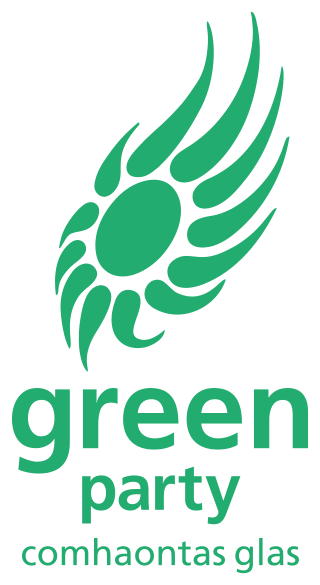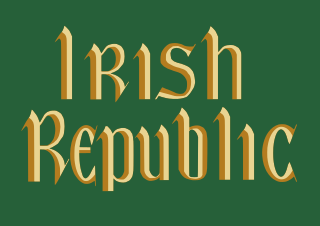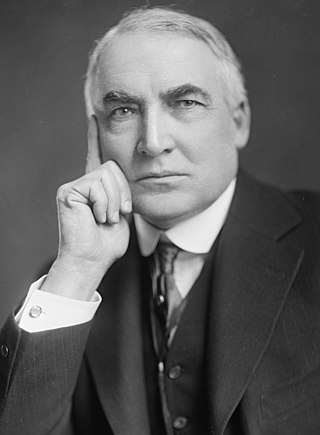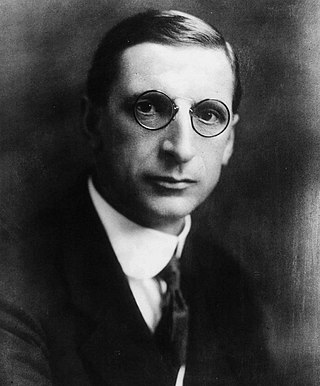
The Green Party is a green political party that operates in the Republic of Ireland and Northern Ireland. As other like-minded Green parties, it has eco-socialist/green left and more moderate factions. It holds a pro-European stance. It was founded as the Ecology Party of Ireland in 1981 by Dublin teacher Christopher Fettes. The party became the Green Alliance in 1983 and adopted its current English language name in 1987 while the Irish name was kept unchanged. The party leader is Eamon Ryan, and the deputy leader is Catherine Martin and the cathaoirleach (chairperson) is Pauline O'Reilly. Green Party candidates have been elected to most levels of representation: local government, Dáil Éireann, the Northern Ireland Assembly, and the European Parliament.

Sinn Féin is an Irish republican and democratic socialist political party in both the Republic of Ireland and Northern Ireland.

The 1920 United States presidential election was the 34th quadrennial presidential election, held on Tuesday, November 2, 1920. In the first election held after the end of the First World War and the first election after the ratification of the Nineteenth Amendment, Republican Senator Warren G. Harding of Ohio defeated Democratic Governor James M. Cox of Ohio. Both major-party vice-presidential nominees would later succeed to the presidency: Calvin Coolidge (Republican) upon Harding's death in 1923 and Franklin D. Roosevelt (Democratic) after defeating Republican President Herbert Hoover in 1932. This was one of only six presidential elections where both major candidates had the same home state.

The 1970 United Kingdom general election was held on Thursday 18 June 1970. It resulted in a surprise victory for the Conservative Party under leader Edward Heath, which defeated the governing Labour Party under Prime Minister Harold Wilson. The Liberal Party, under its new leader Jeremy Thorpe, lost half its seats. The Conservatives, including the Ulster Unionist Party (UUP), secured a majority of 30 seats. This general election was the first in which people could vote from the age of 18, after passage of the Representation of the People Act the previous year, and the first UK election where party, and not just candidate names were allowed to be put on the ballots.
The Social Democratic and Labour Party is a social-democratic and Irish nationalist political party in Northern Ireland. The SDLP currently has eight members in the Northern Ireland Assembly (MLAs) and two members of Parliament (MPs) in the House of Commons of the United Kingdom.

The 1918 Irish general election was the part of the 1918 United Kingdom general election which took place in Ireland. It is a key moment in modern Irish history because it saw the overwhelming defeat of the moderate nationalist Irish Parliamentary Party (IPP), which had dominated the Irish political landscape since the 1880s, and a landslide victory for the radical Sinn Féin party. Sinn Féin had never previously stood in a general election, but had won six seats in by-elections in 1917–18. The party had vowed in its manifesto to establish an independent Irish Republic. In Ulster, however, the Unionist Party was the most successful party.

The 1998 Northern Ireland Assembly election took place on Thursday, 25 June 1998. This was the first election to the new devolved Northern Ireland Assembly. Six members from each of Northern Ireland's eighteen Westminster Parliamentary constituencies were elected by single transferable vote, giving a total of 108 Members of the Legislative Assembly (MLAs).
The Alliance Party of Northern Ireland (APNI), or simply Alliance, is a liberal and centrist political party in Northern Ireland. Following the 2022 Northern Ireland Assembly election, it was the third-largest party in the Northern Ireland Assembly, holding seventeen seats, and broke through by placing third in first preference votes in the 2019 European Parliament election and polling third-highest regionally at the 2019 UK general election. The party won one of the three Northern Ireland seats in the European Parliament, and one seat, North Down, in the House of Commons, the lower house of the Parliament of the United Kingdom.

The 2003 Northern Ireland Assembly election was held on Wednesday, 26 November 2003, after being suspended for just over a year. It was the second election to take place since the devolved assembly was established in 1998. Each of Northern Ireland's eighteen Westminster Parliamentary constituencies elected six members by single transferable vote, giving a total of 108 Members of the Legislative Assembly (MLAs). The election was contested by 18 parties and many independent candidates.

The 1951 United Kingdom general election was held twenty months after the 1950 general election, which the Labour Party had won with a slim majority of just five seats. The Labour government called a snap election for Thursday 25 October 1951 in the hope of increasing its parliamentary majority. However, despite winning the popular vote and achieving both the highest-ever total vote until it was surpassed by the Conservative Party in 1992 and again in 2019 and the highest percentage vote share, Labour won fewer seats than the Conservative Party. That was caused mainly by the collapse of the Liberal vote, which enabled the Conservatives to win seats by default. The election marked the return of Winston Churchill as Prime Minister and the beginning of Labour's 13-year spell in opposition. It was the third and final general election to be held during the reign of King George VI, as he died the following year on 6 February and was succeeded by his daughter, Elizabeth II. It was the last election in which the Conservatives did better in Scotland than in England.

The 1918 United Kingdom general election was called immediately after the Armistice with Germany which ended the First World War, and was held on Saturday, 14 December 1918. The governing coalition, under Prime Minister David Lloyd George, sent letters of endorsement to candidates who supported the coalition government. These were nicknamed "Coalition Coupons", and led to the election being known as the "coupon election". The result was a massive landslide in favour of the coalition, comprising primarily of the Conservatives and Coalition Liberals, with massive losses for Liberals who were not endorsed. Nearly all the Liberal MPs without coupons were defeated, including party leader H. H. Asquith.

Belfast South is a parliamentary constituency in the United Kingdom House of Commons. The current MP is Claire Hanna of the SDLP.

The Northern Ireland Labour Party (NILP) was a political party in Northern Ireland which operated from 1924 until 1987.

Anti H-Block was the political label used in 1981 by supporters of the Irish republican hunger strike who were standing for election in both Northern Ireland and the Republic of Ireland. "H-Block" was a metonym for the Maze Prison, within whose H-shaped blocks the hunger strike was taking place.

The 2005 United Kingdom general election was held on Thursday 5 May 2005, to elect 646 members to the House of Commons. The governing Labour Party, led by Tony Blair, won its third consecutive victory, with Blair becoming the second Labour leader after Harold Wilson to form three majority governments. However, its majority fell to 66 seats compared to the 167-seat majority it had won four years before. This was the first time the Labour Party had won a third consecutive election, and remains the party's most recent general election victory.
The Northern Ireland Conservatives is a section of the United Kingdom's Conservative Party that operates in Northern Ireland. The party won 0.03% of the vote in the 2022 Northern Ireland Assembly election and 0.7% of the vote in the 2019 United Kingdom General election in Northern Ireland.

There are five types of elections in the United Kingdom: elections to the House of Commons of the United Kingdom, elections to devolved parliaments and assemblies, local elections, mayoral elections, and police and crime commissioner elections. Within each of those categories, there may also be by-elections. Elections are held on Election Day, which is conventionally a Thursday, and under the provisions of the Dissolution and Calling of Parliament Act 2022 the timing of general elections can be held at the discretion of the prime minister during any five-year period. All other types of elections are held after fixed periods, though early elections to the devolved assemblies and parliaments can occur in certain situations. The five electoral systems used are: the single member plurality system (first-past-the-post), the multi-member plurality, the single transferable vote, the additional member system, and the supplementary vote.

The 2014 United Kingdom local elections were held on 22 May 2014. Usually these elections are held on the first Thursday in May but were postponed to coincide with the 2014 European Parliament Elections. Direct elections were held for all 32 London boroughs, all 36 metropolitan boroughs, 74 district/borough councils, 19 unitary authorities and various mayoral posts in England and elections to the new councils in Northern Ireland.

The 2015 United Kingdom general election was held on Thursday 7 May 2015 to elect 650 Members of Parliament to the House of Commons. It was the only general election held under the rules of the Fixed-term Parliaments Act 2011. Local elections took place in most areas of England on the same day.

The 2022 Gateshead Metropolitan Borough Council election took place on 5 May 2022. One third of councillors — 22 out of 66 — on Gateshead Metropolitan Borough Council were elected. The election took place alongside other local elections across the United Kingdom.
















